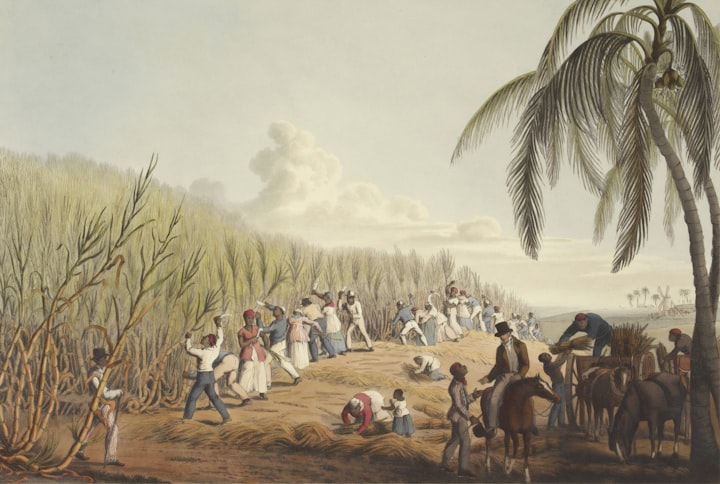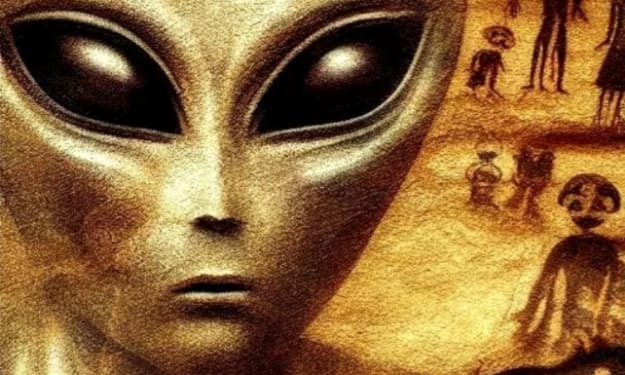Freedom Cry
The Origins of Slavery in America

I am present the origins of slavery starting from the Atlantic slave trade with Europeans capturing and transporting Africans through the Middle Passage to the rise of slavery in America and King Cotton.
European countries such as Portugal, France, Spain and England, sought to conquer and colonize Africa and the Americas, but needed labor to build their settlements and plantations in the American colonies. This led to capturing and transporting 2,000 Africans per year through the Middle Passage totaling over 11 million taken to the Americas to be enslaved. The Middle Passage involved African rulers selling their own people to Europeans in exchange for products such as sugar, rum, tobacco and raw materials. The Slave ships called “Slavers” were extremely unsanitary that caused many Africans to die from diseases such as malaria and yellow fever. Those who were ill would be thrown into the ocean. Once the voyage through the Middle Passage was over and the ships arrived in the Americas to auction off Africans into slavery.
The Atlantic Slave Trade lasted for over three centuries and it was not until the late 1700s and early 1800s, that the process began to fade and eventually cease due to protests by abolitionists, investing in industry, outlawing the trade and colonial empires in Africa established by the English, Portuguese, French and Belgians.
In colonial America, Blacks were not seen as people but property. Tobacco was a major resource that was harvested on plantations, and this led to rapid transition from white indentured servants to slaves. Both Black and women worked in the hot fields from morning to evening and were relentlessly pressured by their masters to work harder. The men would have hard labor jobs such as blacksmith, carpenter and shoemaker, while women would do domestic work inside such as cleaning, cooking and being caretakers. The slaves would wear ragged clothes, live in shabby cabins with dirt floors and their main diet were primarily beef, fish and rice.
African-Americans were split during the Revolutionary War, fighting for either the Continental Army or the British in hopes of gaining freedom. Black Enlightenment fueled this ideology with advocates such as Phillis Wheatley and Benjamin Banneker embracing rationalism in a campaign to convince the newly formed United States what freedom really means. Which resulted in the small victory of Northern slavery beginning to fade, the rise of Black leaders and free blacks obtaining second class citizenship.
Slavery was still a major trend in America and had to be maintained, due to fear from whites that enlisting slaves in combat such as the War of 1812, and frustration with limited freedom in the north would give blacks a sense of revolution to forcibly end the practice by the Missouri Compromise in 1820. As the westward expansion of slavery grew, so did agriculture which made up 75% of the slave population between 1790 and 1860. Cotton was the South’s most sacred product as it fueled its economy, along with the production of tobacco, sugar, rice, hemp and livestock to support the growth, becoming the Cotton Kingdom. This was from the result of black labor, who despite suffering whippings, exploitation and other abuse, managed to stay positive and maintain character through family, church, and cultural traditions to overcome the brutal hardships of slavery.
The number of free blacks was significantly smaller compared to the amount of slaves and white people in America. Beginning with the Jacksonian era America built its foundation by exerting racial dominance. This meant establishing regulations and “Jim Crow” which saw blacks being disenfranchised, restricted from moving to other states, required to show proof of freedom or be enslaved, states exercising the Fugitive Slave Law and advocating segregation in neighborhoods and public facilities. The only places where blacks found refuge from oppression were churches.
White oppression was so strong in the United States, this ultimately led to gradual development of antislavery movements both in Northern and Southern territories. Both were fueled by Christianity with the Bible, African culture/religion and the black church serving as catalysts for a revolution against slavery. The South saw slaves practice this but only in small numbers, whereas the North gained prominence through the actions of free blacks and white abolitionists. The former opposed slavery through violence with radicals like Nat Turner who led a revolt in Virginia, and the latter fought against it through peaceful actions in written works such as David Walker’s Appeal which denounced the idea of slavery and discreetly motivated slaves to rebel and escape their masters.
The spark of rebellion against slavery was so influential in the United States that it ultimately evolved into a full revolution by 1831 which lasted until the Civil War. Influencers like Frederick Douglass and William Llyod Garrison were prime advocates of freedom for African-Americans while affiliated with the American Anti-Slavery Society. Garrison advocated emancipation and equal rights for blacks through his newspaper, the Liberator, in a peaceful manner. Although Garrison himself maintained his racial superiority when consulting with Douglass and other black abolitonists in the AASS. They worked together to criticize slave masters, point out how slavery was a hindrace to the economy, and use moral suasion to convince the North and South to end slavery. This revolution ultimately led to creation of the Underground Railroad which consisted of trails from the southern region of the U.S such as Kentucky and Missouri, to Canada, with black and a few white vigilance groups aiding fugitive slaves in escaping to the North.
Frederick Douglass was one of the most iconic abolitionists and orators of the 19th century. He protested and helped changed America’s views of slavery through his actions and personal writings. Douglass is well known for his autobiographies detailing his childhood as a slave to being educated by the wife of his master Hugh Auld to his escape from slavery. All of which had a strong impact on his writings. The oratory skills he executed left the biggest influence on Civil War Era literature.
The legendary Frederick Douglass was born in February 1818, in the state of Maryland. He was self-educated and made it his mission to escape the nightmare of slavery. He failed to escape the first time but was successful the second time in 1838. Douglass’ time as a slave and the hardships he faced such as whoopings, near starvation with little meals, and extreme racism. His disgust of slavery led him write his well known autobiography, Narrative Of the Life Of Frederick Douglass, and others. Douglass uses a straight-forward but logical strategy to exhibit his deepest thoughts and feelings on being a slave in Maryland. One description from the narrative, “I have often been so pinched with hunger as to dispute with old “Nep, the dog, for the crumbs which fell from the kitchen table” (Douglass, 34).
The driving force behind the Douglass’ was to persevere through the tough days in the hope that he would be liberated. What makes Douglass’ books so incredible is that the stories within him are his real life dealing with slavery, and his goal to show the world how terrible slavery really was. Being abolitionist, Frederick Douglass advocated for emancipation and suffrage, consulting with President Abraham Lincoln about how black soldiers should be treated and continuing his now-flourishing career as orator. Over the course of his life, he had many writings on the subject of emancipation and his life as a slave (Huggins et al.,1980).
Two social issues that Frederick Douglas would no doubt protest are the killings of African-American males by white police officers and Confederate flags/statues in various states of the U.S. For the former, Douglass loved his people immensely and did not want them to be whooped or killed. The issue of black males being killed by white cops has been an ongoing problem for years in today’s society from victims like Michael Brown, Walter Scott, and Eric Garner. These wrongful deaths caused by white cops happened back to back and being a proud black man himself. I would say Frederick Douglass would have books/articles and even videos heavily criticizing police departments all over the country.
As for the Confederate flags and statues in the United States, Douglass despised the Confederacy and everything they stood for. He makes the hatred obvious by saying, “Shoot down the Confederacy and uphold the flag; the American flag” (Douglass, 1865). With the abundance of flags and statues in public places Frederick Douglass would be a prominent protestor through meetings with the president and national articles to have them removed completely. Especially since the Union won the Civil War and slavery was erased. Thus making the Confederacy insignificant and not to be commemorated.
Finally, Frederick Douglass is one of the most loved and respected civil rights leaders of all time. Even earning the title, “Father of the civil rights movement”. His brilliance, articulation and determination are a national treasures in America, and he will forever be known by everyone through his books on the chaos of slavery and racism that personify Frederick Douglass’ legacy.
Canada became the safe haven for blacks seeking freedom due the British Empire outlawing slavery after 1833, and the enhancement of the fugitive slave law following the Compromise of 1850. Blacks are almost immediatley enslaved based on documentation of slave owners, and required anyone, whether a citizen or official, to apprehend runaway slaves or else they would be prosecuted for helping them. Over time the North became less supportive of slavery when westward expansion began and the Gold Rush prospered. This included creating its own laws that restricted law enforcement officials from capturing runaways. The biggest factor was the North thought slavery would be a giant burden on the path to being successful farmers, shopkeepers and other occupations in the west and should be excluded. Whereas the South saw it as a necessity. The contrasting philosophies and the result of Dred Scott vs Sandford, which denied American citizenship to blacks, were the building blocks of the Civil War.
When the Civil War broke out America was dangerously divided on the concept of slavery, as the Union and Confederacy had different ideals on the practice. The North felt that it had become redundant, while the house thought slavery had to continue for the economy to thrive. President Abraham Lincoln’s mission in the Civil War was not to abolish slavery, but to bring stability to the United States by shipping African-Americans to Africa, Central America and Carribean. Lincoln felt blacks could not integrate into a white society and feared that he were to advocate abolishment and racial equality, the border slave states that were loyal to the Union would defect to the Confederacy. The factors that pressured Lincoln into issuing the Emancipation Proclamation under political and military motivation, include thousands fugitive slaves known as “contrabands” escaping to the North seeking refuge from the Confederates that was spearheaded by General Benjamin Butler, the Confiscation Acts, the Battle of Antitetam, and Radical Republicans. The abundance of ex-slaves were used to the Union’s advantage by enlisting them into the army and became a key factor in the war effort as they outnumbered Confederate troops. The North’s willingness to have black men fight was a stark contrast to the South who saw it as ridiculous and risky to have African-Americans wield guns. Black Union soldiers faced discrimination however, which caused abolitionists such as Frederick Douglass to protest and debate with President Lincoln for tolerating the harsh treatment.
The Battle of Gettysburg was a turning point in the Civil War and the 13th Amendment was eventually ratified which ended slavery as a whole. In the wake of Lincoln’s assassination in 1865 by John Wilkes Booth, Andrew Johnson operated the Reconstruction plan and quickly reversed the effect of the Freedmen’s Bureau. He granted confiscated land back to prewar owners in the South under the oath of loyalty to the Union, while still maintaining the abolition of slavery. This action led to many problems such as the establishment of Black Codes, which restricted African-Americans' involvement in southern politics and kept them as a labor force. Black Codes would later evolve into the Jim Crow Laws. Radical Republicans in Congress impeached President Johnson after he vetoed the Freedmen’s Bureau and Civil Rights Bill in 1866, and overrode his decision. After taking over Reconstruction, Radical Republicans sought to make blacks full fledged citizens by ratifying the 14th and 15th amendments, which granted equal protection and the right to vote. The establishment of Black politicians raised in the church were elected into Congress and state legislatures through alliances with carpetbaggers and scalawags was strong in the new United States with Hiram Revels, the first black elected into the Senate and Blanche Bruce being the most notable, but were undermined in the government. The drastic changes of Radical Reconstruction led to the rise of Ku Klux Klan, a white supremist group who terrorized White and Black Republican leaders, and lynched African-American citizens who challenged white authority and never face legal consequences. The tyranny thwarted President Ulysses Grant’s campaign to preserve black suffrage and other political abilities. Thus reestablishing white dominance in the South by the 1870s, and Blacks being forced to live as sharecroppers and disenfranchised citizens with little to no opportunities for a better life. White supremacy ultimately resulted in multiple riots (Wilmington and Phoenix), rapings, lynchings, Jim Crow (Plessy vs Ferguson), and the end of the Reconstruction era.
About the Creator
Kylecovey Smith
Historian, Linguist, Author (Voyages of the 997 & The Method Mission), YouTuber/TikToker (Master Mojo) and now Vocal writer enjoy and critique my writing as please.






Comments (1)
Kylecovey, I will return to read this soon, but wanted to say hello now.